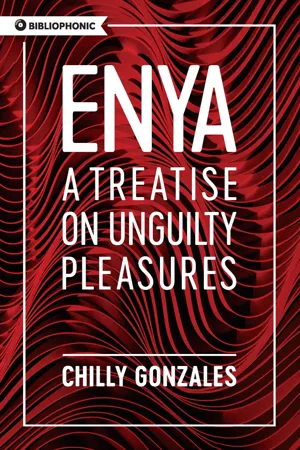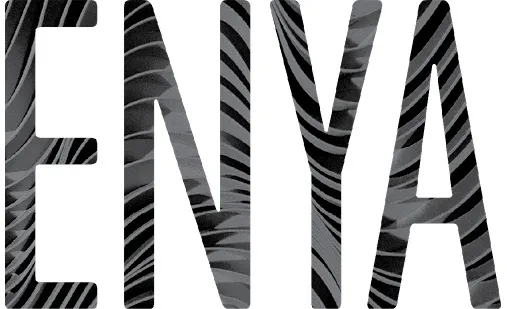![]()
Invisible Publishing
Halifax & Prince Edward County
![]()
Copyright Information
Text copyright © 2020 Jason “Chilly Gonzales” Beck
Originally published as Chilly Gonzales über Enya by Verlag Kiepenheuer & Witsch, 2020
All rights reserved. No part of this publication may be reproduced or transmitted in any form, by any method, without the prior written consent of the publisher, except by a reviewer, who may use brief excerpts in a review, or, in the case of photocopying in Canada, a licence from Access Copyright.
Cataloguing data available from Library and Archives Canada
Bibliophonic Series editor: Del Cowie
Cover by Megan Fildes
Typeset in Laurentian & Slate by Megan Fildes
With thanks to type designer Rod McDonald
Printed and bound in Canada
Invisible Publishing
Halifax & Prince Edward County
www.invisiblepublishing.com
Published with the generous assistance of the Canada Council for the Arts, the Ontario Arts Council, and the Government of Canada.
![]()
Lullaby Voice
I don’t remember my mother ever singing me a lullaby. She had many voices, just not one for lullabies. She had a squawking Jewish mother voice for storytelling, an icy almost-British accent for when she was having fights, an exaggerated Miss Piggy yell to get our attention in the basement (this was the voice she was best known for among my friends)… but she didn’t have a soothing voice in her repertoire. She was never natural, always performing. So, no lullabies for me.
And anyway, a lullaby isn’t a performance. It’s basically folk music; it serves a social purpose. The lullaby already existed before the conscious pretense of artistic musical expression. Maybe I’m romanticizing, but folk music (communal storytelling through music) always seemed less selfish as compared to pop music (Lionel Richie dancing upside down). At least, my pop music felt selfish: I started making music to get attention, to live out a fantasy. I made sure that my virtuosity was proof of my talent and the worst insult I could imagine was someone telling me it reminded them of a lullaby. My motivation was so ego-driven, how was my music supposed to bind people together? I always envied musicians who made music for a social purpose: gospel musicians for God, DJs for dancing, folk musicians for community, and lullabies for soothing children.
Contra pop music, a lullaby has no backing band or beat. Usually zero accompaniment. It has to work by itself a cappella. You can’t rely on a strange, unexpected harmonic twist to provide drama in the musical storytelling, like the “nothing really matters” chord in the opening of “Bohemian Rhapsody.” You can’t count on a sonic surprise like the awkward stutter of muted guitar strings before the chorus of Radiohead’s “Creep.” No saxophone solos, no filter sweep, no autotune. A lullaby, in fact, is pure melody, the voice itself.
I’ve always been old-fashioned when it comes to respecting melody. Melody is the surface of a song, the facade of the building. So, when someone asks you if you’ve heard a new song, they’ll just sing the melody. You know the one that goes “groove is in the hea-ar-ar-ar-art?” For most people, the melody is the whole song.
Harmony—the chords that support the melody—is the invisible foundation of the building. These chords have the unglamorous power to maximize emotions in a song, but chords aren’t enough to be a song by themselves, and you definitely can’t hum a chord. Imagine “With or Without You” if Bono never started singing. Harmony is melody’s bitch, with no life of its own.
Hearing a melody a cappella, divorced from its harmony and expelled from its sound-world, is a kind of test. Does it still sound like music, when it’s sung, just like that, by a civilian (an amateur)? The ultimate test: How does it sound when sung by your mother?
If it passes this test, the melody indeed becomes the whole song—music’s synecdoche. All lullabies have passed this test; they’ve survived for centuries. They’re still there after capitalism, sleeping pills, and the invention of recording, never outgrowing their original purpose.
That’s probably why we don’t listen to recordings of lullabies. They don’t exist as recordings the way pop songs do. A pop song is a specific moment in time captured by a specific artist; it belongs to that artist and we acknowledge their ownership, it will always sound the same. Hearing it live, or hearing a cover version of it, will still always refer us back to the original.
There is only one “Take On Me” and it is by a-ha, and if we hear some eighties tribute band performing it, we are comparing it to the 1981 studio performance of “Take On Me.” There is no imagining the song without the precise combination of cheesy drum sounds and the voice of Morten Harket (I just Googled his name). A pop song is alive only at the moment that it is born—from then on it is frozen like a caveman in ice. It’s near-impossible to get people to hear a cover of an iconic pop song with fresh ears, as if for the first time. I know; I’ve tried.
When I first switched to piano-only concerts in 2004, one of my best/worst ideas was to re-arrange eighties pop songs using jazz and classical gestures. One of the songs I devised was a faux-Baroque arrangement of Enya’s “Orinoco Flow” (the “sail away” song). But my cover didn’t really have a chance to be heard objectively. It could only remind people of the original version, still living rent-free in everyone’s collective nostalgia-mind.
Folk music doesn’t have this baggage: there’s no original recording of a lullaby. It’s not even something we can evaluate on the basis of musical taste. It either works at its function or it fails. The baby sleeps or it doesn’t (as in comedy, the crowd laughs or it doesn’t). We don’t know or care who composed it. It only matters who is singing it.
So, what kind of voice works when it comes to the lullaby? A soothing voice, a reassuring voice, something that takes away pain, doubt, something that makes the listener feel safe, something gentle and patient—a voice you can trust as natural. An unnatural voice may fool some of the people, but authenticity is something that we just know when we hear it.
Some years ago, a friend got so excited to play me something new he had discovered. He couldn’t believe I hadn’t heard it yet, everyone was talking about it, I was going to love it so much, he said. I hate being told I’ll love something before I’ve had the chance to decide for myself. He pressed play. Guitar music, not my cup of tea. But it had enough harmonic flair, the feel of the drums was a relatively disciplined combination of...

